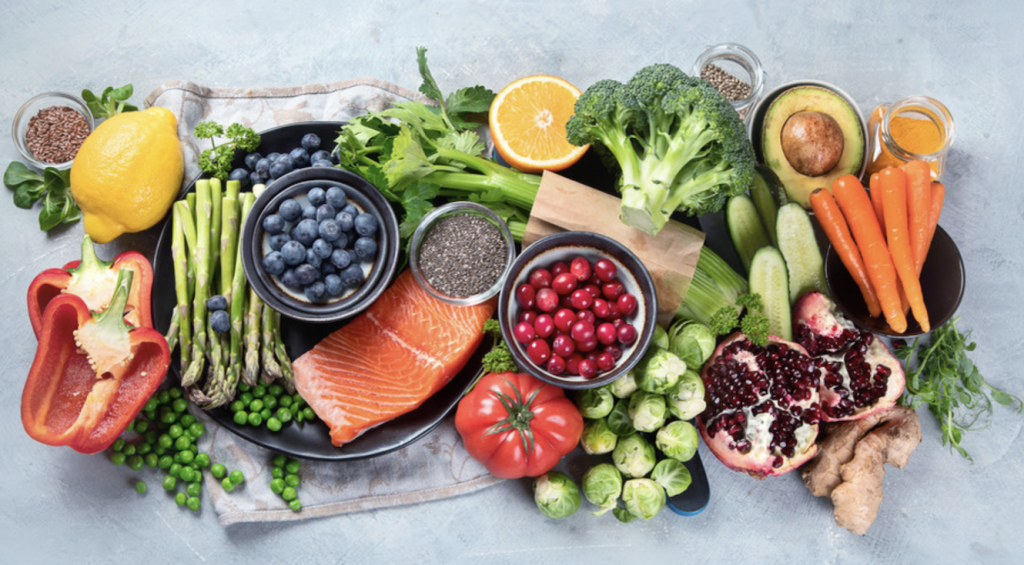Thyroid – The Master Gland of Metabolism and How to Support it

By Sue Camp
Registered Nutritional Therapist
Do you experience tiredness, difficulty losing weight, or other concerns like lethargy, cold hands and feet, constipation, changes in your hair and skin, low mood or memory and concentration? These are common symptoms which we see in clinical practice and can be linked to the thyroid function.
Thyroid hormones influence every cell in your body. Your cells have receptors for these hormones, and while the most noticeable effects are on metabolism, it can influence many other body systems too. The ancient Greeks called the thyroid gland “thyreos,” meaning shield – a fitting name considering its shape and role. Think of it as setting the speed limit for your body.
Insufficient thyroid hormone is called underactive or hypothyroidism. If you have too much, it’s known as overactive or hyperthyroidism. Hypothyroidism is more common, especially in women. In the UK, it affects 15 out of every 1,000 women and 1 out of 1,000 men, and even children can experience it. Keep in mind, these numbers might be higher because some cases go undiagnosed.
Your thyroid gland is a butterfly-shaped powerhouse in your neck, right in front of your windpipe and above your collarbone. Its role is to produce thyroid hormones, and this happens in seconds. Your body is cleverly regulating this process all the time, using a feedback system that checks the levels of these hormones in your blood. If your thyroid hormone levels are low or your metabolism is slow, your body gets the signal to make and release more thyroid hormones. It’s a fascinating and ongoing process.

Thyroid hormones have profound effects on many essential physiological processes, including development, growth and metabolism.
The cellular effects of our thyroid hormone include the following:
- Increase basal metabolic rate and influencing temperature control
- Increase breakdown of fat to influence levels of body fat and body weight
- Increase all aspects of carbohydrate metabolism
- Stimulate both protein synthesis and degradation and play an important role in
normal growth and development. - Direct and indirect effect on bone synthesis and turnover
The good news is, there are things you can do with your diet and lifestyle to support and improve your thyroid function. Dietary guidelines for supporting thyroid function require building the diet around whole grains, plant proteins, lightly cooked and raw vegetables, lean organic meat, fish and poultry, ideally organic dairy produce and some fruit. Including a wide variety of food ensures a wide variety of nutrients.
Specific nutrients that support thyroid function include the following:
| Nutrient | Food Source |
| Tyrosine – essential component of thyroid hormone | Poultry (including turkey, quail, chicken and duck), meat (including beef, pork and game meat), seafood (including fish such as cod, haddock, salmon, pike and perch as well as crab and shrimp), eggs, milk, yogurt, cottage cheese, cheese, almonds, pumpkin seeds, sesame seeds, soy products, lima beans, edamame beans, spinach, avocados and bananas |
| Iodine – essential component of thyroid hormone | Fish (salmon, sardines), seafood and sea vegetables (e.g. kelp, dulse, nori, arame, wakame, kombu) followed by eggs, milk and milk products, meat and marine iodised salt. |
| Selenium – deiodinase enzyme is selenium- dependant | Brazil nuts, Crimini mushrooms, shiitake mushrooms, shrimp, tuna, sardines, salmon, eggs, turkey, lamb, oats, chicken, tofu, sunflower seeds, asparagus, spinach |
| Iron – supports the binding of T3 to the cell receptors | Red meat, egg yolks, dark, green leafy greens (spinach, kale and collards), legumes (beans, lentils, chickpeas and soybeans), liver, artichokes, tofu |
| Zinc – required for T3 conversion | Lamb, pecans, almonds, walnuts, Brazil nuts, ginger root, whole wheat, rye, oats and sardines. |
| B Vitamins – important for energy production | Vitamin B2: Organ meats, almonds, milk, wild rice, mushrooms, egg yolks, green vegetables Vitamin B3: rice bran, peanuts, liver, turkey, chicken, dairy products, salmon, mackerel, eggs Vitamin B6: sunflower seeds, tuna, liver, walnuts, salmon, trout, lentils, beans, brown rice and bananas. |
| Antioxidants – Vits A, C and E – protect against oxidation reactions and cell damage | Vitamin A: Retinol: cheese, eggs, oily fish (particularly mackerel), milk, fortified vegetable margarine and yoghurt. Carotenoids: yellow and orange Vitamin C: peppers, parsley, green leafy vegetables, strawberries, papaya, and citrus fruits Vitamin E: sunflower seeds, almonds, peanut oil, olive oil, peanuts, and wheat germ. |
The adrenal gland and thyroid gland are inextricably linked. Chronic stress can alter the communication between the brain and the hormone glands. It hampers the production and the conversion of the thyroid hormones and can cause cells to lose sensitivity. Managing stress can help to improve overall thyroid function.
But autoimmunity is possibly the most common cause of thyroid dysfunction. Autoimmune thyroid diseases (AITD), including Graves’ disease (GD) and Hashimoto’s thyroiditis (HT) are prevalent autoimmune diseases, affecting up to 5% of the general population.

Hashimotos disease is an autoimmune disorder that destroys thyroid tissue and is the most common cause of hypothyroidism. It often goes undiagnosed. Risk factors for developing Hashimotos include gluten intolerance, insulin resistance, oestrogen fluctuations, vitamin D deficiency, chronic infection, inflammation and or an immune response to heavy metals or environmental pollutants.
Thyroid hormone function is complicated, and this article only touches on a few important points. If you are concerned about your thyroid function then please address this with your clinician and ask about comprehensive functional testing of the complete thyroid pathway including T4, T3 and Reverse T3 as well as thyroid antibodies. Thyroid testing needs to go beyond simply considering TSH levels and needs to be monitored regularly.
BOOK A CALL WITH OUR FRIENDLY ASSESSMENT TEAM
Please check Our Fees page before booking a call.
Choose a day and time that works for you.
Tell us what is going on for you.
Let us explain how we can help.
ONLINE NUTRITIONIST COACHING
Learn more about Health and Wellbeing
Here are some articles and blogs about health and wellbeing



